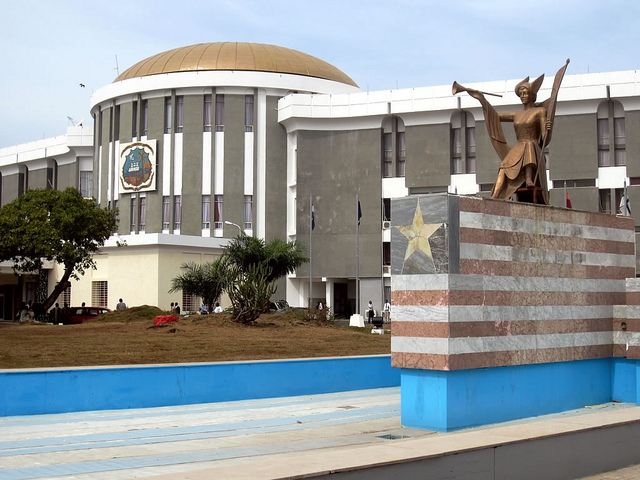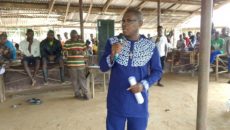MONROVIA, Montserrado – After failed efforts at institutional reform, the legislature still lacks needed transparency; there is still no way for citizens to know how their lawmakers vote on particular issues.
A recent investigation conducted by The Bush Chicken shows that a system installed at the legislature to track votes is not being prioritized by the lawmakers. They have stuck to voting on yeas and nays and relied on manual head-counts.
The situation makes it impossible to get records of how individual lawmakers vote on bills and issues on the floor. The only records available with the manual headcount voting system are the numbers of lawmakers who voted for, against or abstained.
But things were not meant to be this way. In 2009, the 52nd Legislature and the country’s development partners jointly drafted and endorsed a plan to modernize activities of the legislature between 2009 and 2013.
The modernization plan was supported by the National Democratic Institute, the Embassy of the People’s Republic of China, Konrad Adenaeur Foundation, ECOWAS, AU, UNDP, and UNMIL. It was also endorsed by both houses of the legislature. Then-Speaker Alex Tyler and President Pro Tempore Cletus Wortorson signed the document on behalf of the legislature.
The document aimed to make the legislature compliant with the needs and realities of the 21st century. The plan outlined a number of critical activities including mechanisms to strengthen representation, lawmaking, oversight, and staffing, as well as to improve working environments.
Accordingly, the legislature and partners agreed to support the installation of voting recording and public address systems in all chambers as well as to improve inner policies to enhance openness and efficiency.
Since then, development partners, including the World Bank and National Democratic Institute, have made contributions aimed at achieving these goals. However, the legislature has done little to transform itself.
In an interview last year, the director for the Legislative Information Service, McCarthy Weh, said not even one-half of the goals of the reform had been achieved. He cited a lack of interest from the leadership of both houses of the legislature to support the policies as a serious challenge.
As part of support under its Economic Governance Institutional Reform Project, the World Bank in 2010 funded the installation of the electronic voting and public address system in both chambers of the legislature. The system can also record lawmakers’ attendance.
At the upper house, the senate director for communications, Jalawa Tompoe, refused to comment on why senators were not using the system.
The deputy director for the senate IT section, Fitzgerald Karto, had already told The Bush Chicken in an interview that the electronic voting system in the Senate’s chamber was still up to date and requires no difficulty or extra cost to use.
“The system was installed in a way that it can be used both as a public address system to deliberate issues and to vote,†Karto said. “With the software controlling the system, once a lawmaker is present in session and inserts his electronic card into the system, it will reflect on the electronic board and the microphones would also be identified because they are assigned according to counties with numbers attached for identification. Similarly, for the voting process, the system records if a lawmaker voted for, against, or abstained.â€
He confirmed that the system has not been prioritized by the lawmakers.
“As for the Senate, the system has been used only three times under the Armah Jallah leadership,†he added.
Isaac Redd, the director of communications at the House of Representatives, said the system in the chambers of the lower house could not be used because it was not fully installed. Redd did not state why the system’s installation has not been completed since 2010.
However, Michael Nyumah Sahr, the World Bank’s communication associate in Liberia, explained to The Bush Chicken in an email that under the World Bank’s policy, the legislature takes responsibility for the maintenance and repairs of the system.
Sahr said the project under which the electronic voting system was installed at the legislature has been closed since June 2015.
“Under World Bank’s policies, once a project is closed, all assets are transferred to the beneficiary of the project. Subsequently, the beneficiary is responsible for the maintenance or repairs of all the assets acquired which, in this case, is the electronic voting system,†he wrote.
NDI Liberia program manager Thomas Du says the failure of lawmakers to prioritize using the electronic voting system is a “defeat†to the purpose of the legislature. Du confirmed that the system in the Senate’s chambers is well-functioning, while the one at the House’s has a defect.
He said it was the legislature who requested assistance from the World Bank for the installation of the system, while the NDI provided orientation for lawmakers and training for legislative staff on the usage and operation of the system.
Du said apart from the training, NDI also provided a printer to extract records from the system and at the same time mounted bulletins to both entrances of the legislature so that daily and voting records of lawmakers would be available to the public after being printed.
One key reason the system was provided, he said, was to establish accountability for attendance record and compliance with the standing rules of both houses by individual lawmakers, especially the rule of attending session in time.
“Most times, the roll call is done and a quorum is established as long as they obtain the number that should be able to establish a quorum according to their rules,†Du said. “But they have not ever been serious about the time the number was acquired, and it is important because their rule says they should work from 10:00 a.m. So if by 10:00 there is a roll call and you have less number of people, technically, there should be no quorum –and that was one of the purposes of establishing the system, so that attendance record could be established for legislators; not necessarily that you attended session, but whether you attended session on time according to their rules.â€
Du said it is important to make voting records of individual lawmakers available because it enhances transparency and provides information to the public on how their lawmakers are representing their interests.
He said Gbarpolu Senator Daniel Naatehn personally informed him that he was not re-elected in 2011 because he could not make available records of his stance on issues at the legislature after being challenged several times by his opponents to do so. Naatehn lost in 2011 and was reelected in 2014.
The House of Representatives and the current Senate leadership have not provided any justifications for not using the system.
However, Du said, the former president pro tempore, Gbehzohngar Findley, told NDI that using the system was not possible under his leadership because the records of individual lawmakers would be used against them when they are seeking reelection.
He said Findley also informed him that they could not use the system because it was difficult to obtain a quorum at 10:00 a.m. according to the Senate’s rules. However, the standing rules of each house of the legislature provide for amendments of any provision by majority votes.
These reasons, according to Du, did not show that the Senators were transparent and sincere in their activities.
“If you have a firm reason for voting against a particular issue, you should stand by your conscience. You should be able to explain that to your constituents. If it means they would not reelect you, fine; but at least in your mind you will feel that you did good representation,†he said.
Du said lawmakers, as public officials, must learn to take responsibility for their actions and stand for integrity. “One of the ways lawmakers work around the world is by making their work open to the public.â€
He criticized the legislature for conducting most of its work in secret sessions. “If the voting record shows too many times that you have secret sessions, and reasons for these secret sessions are not known, then people know that half or more than half of the time, you are doing your work in secrecy,†he added.
Du wants lawmakers to see representation as a hallmark of their cardinal responsibilities.
Liberian lawmakers, who make over US$172,000 annually, are increasingly seen as corrupt and concerned only about their own interests. This has led many individuals and groups to call for replacing all lawmakers in the upcoming elections. The lack of a system that tracks how lawmakers vote means that there are no independent means for representatives and senators to defend their records.
Featured photo by David Stanley



